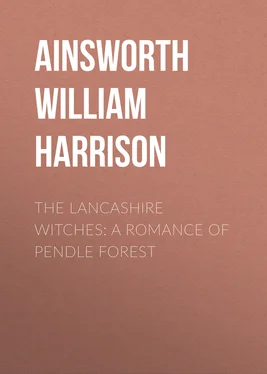William Ainsworth - The Lancashire Witches - A Romance of Pendle Forest
Здесь есть возможность читать онлайн «William Ainsworth - The Lancashire Witches - A Romance of Pendle Forest» — ознакомительный отрывок электронной книги совершенно бесплатно, а после прочтения отрывка купить полную версию. В некоторых случаях можно слушать аудио, скачать через торрент в формате fb2 и присутствует краткое содержание. Жанр: foreign_prose, literature_19, Европейская старинная литература, на английском языке. Описание произведения, (предисловие) а так же отзывы посетителей доступны на портале библиотеки ЛибКат.
- Название:The Lancashire Witches: A Romance of Pendle Forest
- Автор:
- Жанр:
- Год:неизвестен
- ISBN:нет данных
- Рейтинг книги:5 / 5. Голосов: 1
-
Избранное:Добавить в избранное
- Отзывы:
-
Ваша оценка:
- 100
- 1
- 2
- 3
- 4
- 5
The Lancashire Witches: A Romance of Pendle Forest: краткое содержание, описание и аннотация
Предлагаем к чтению аннотацию, описание, краткое содержание или предисловие (зависит от того, что написал сам автор книги «The Lancashire Witches: A Romance of Pendle Forest»). Если вы не нашли необходимую информацию о книге — напишите в комментариях, мы постараемся отыскать её.
The Lancashire Witches: A Romance of Pendle Forest — читать онлайн ознакомительный отрывок
Ниже представлен текст книги, разбитый по страницам. Система сохранения места последней прочитанной страницы, позволяет с удобством читать онлайн бесплатно книгу «The Lancashire Witches: A Romance of Pendle Forest», без необходимости каждый раз заново искать на чём Вы остановились. Поставьте закладку, и сможете в любой момент перейти на страницу, на которой закончили чтение.
Интервал:
Закладка:
The information he had obtained proved correct. Ere long a mournful train approached the church, and a bier was set down before the porch. A black hood covered the face of the dead, but the vestments showed that it was the body of Paslew.
At the head of the bearers was Demdike, and when the body was set down he advanced towards it, and, removing the hood, gazed at the livid and distorted features.
"At length I am fully avenged," he said.
"And Abbot Paslew, also," cried a voice above him.
Demdike looked up, but the look was his last, for the ponderous statue of Saint Gregory de Northbury, launched from its pedestal, fell upon his head, and crushed him to the ground. A mangled and breathless mass was taken from beneath the image, and the hands and visage of Paslew were found spotted with blood dashed from the gory carcass. The author of the wizard's destruction was suspected, but never found, nor was it positively known who had done the deed till years after, when Hal o' Nabs, who meanwhile had married pretty Dorothy Croft, and had been blessed by numerous offspring in the union, made his last confession, and then he exhibited no remarkable or becoming penitence for the act, neither was he refused absolution.
Thus it came to pass that the abbot and his enemy perished together. The mutilated remains of the wizard were placed in a shell, and huddled into the grave where his wife had that morning been laid. But no prayer was said over him. And the superstitious believed that the body was carried off that very night by the Fiend, and taken to a witch's sabbath in the ruined tower on Rimington Moor. Certain it was, that the unhallowed grave was disturbed. The body of Paslew was decently interred in the north aisle of the parish church of Whalley, beneath a stone with a Gothic cross sculptured upon it, and bearing the piteous inscription:—" Miserere mei ."
But in the belief of the vulgar the abbot did not rest tranquilly. For many years afterwards a white-robed monastic figure was seen to flit along the cloisters, pass out at the gate, and disappear with a wailing cry over the Holehouses. And the same ghostly figure was often seen to glide through the corridor in the abbot's lodging, and vanish at the door of the chamber leading to the little oratory. Thus Whalley Abbey was supposed to be haunted, and few liked to wander through its deserted cloisters, or ruined church, after dark. The abbot's tragical end was thus recorded:—
Johannes Paslew: Capitali Effectus Supplicio.
12º Mensis Martii, 1537.
As to the infant, upon whom the abbot's malediction fell, it was reserved for the dark destinies shadowed forth in the dread anathema he had uttered: to the development of which the tragic drama about to follow is devoted, and to which the fate of Abbot Paslew forms a necessary and fitting prologue. Thus far the veil of the Future may be drawn aside. That infant and her progeny became the LANCASHIRE WITCHES.
BOOK THE FIRST.
Alizon Device
CHAPTER I.—THE MAY QUEEN
On a May-day in the early part of the seventeenth century, and a most lovely May-day, too, admirably adapted to usher in the merriest month of the year, and seemingly made expressly for the occasion, a wake was held at Whalley, to which all the neighbouring country folk resorted, and indeed many of the gentry as well, for in the good old times, when England was still merry England, a wake had attractions for all classes alike, and especially in Lancashire; for, with pride I speak it, there were no lads who, in running, vaulting, wrestling, dancing, or in any other manly exercise, could compare with the Lancashire lads. In archery, above all, none could match them; for were not their ancestors the stout bowmen and billmen whose cloth-yard shafts, and trenchant weapons, won the day at Flodden? And were they not true sons of their fathers? And then, I speak it with yet greater pride, there were few, if any, lasses who could compare in comeliness with the rosy-cheeked, dark-haired, bright-eyed lasses of Lancashire.
Assemblages of this kind, therefore, where the best specimens of either sex were to be met with, were sure to be well attended, and in spite of an enactment passed in the preceding reign of Elizabeth, prohibiting "piping, playing, bear-baiting, and bull-baiting on the Sabbath-days, or on any other days, and also superstitious ringing of bells, wakes, and common feasts," they were not only not interfered with, but rather encouraged by the higher orders. Indeed, it was well known that the reigning monarch, James the First, inclined the other way, and, desirous of checking the growing spirit of Puritanism throughout the kingdom, had openly expressed himself in favour of honest recreation after evening prayers and upon holidays; and, furthermore, had declared that he liked well the spirit of his good subjects in Lancashire, and would not see them punished for indulging in lawful exercises, but that ere long he would pay them a visit in one of his progresses, and judge for himself, and if he found all things as they had been represented to him, he would grant them still further licence. Meanwhile, this expression of the royal opinion removed every restriction, and old sports and pastimes, May-games, Whitsun-ales, and morris-dances, with rush-bearings, bell-ringings, wakes, and feasts, were as much practised as before the passing of the obnoxious enactment of Elizabeth. The Puritans and Precisians discountenanced them, it is true, as much as ever, and would have put them down, if they could, as savouring of papistry and idolatry, and some rigid divines thundered against them from the pulpit; but with the king and the authorities in their favour, the people little heeded these denunciations against them, and abstained not from any "honest recreation" whenever a holiday occurred.
If Lancashire was famous for wakes, the wakes of Whalley were famous even in Lancashire. The men of the district were in general a hardy, handsome race, of the genuine Saxon breed, and passionately fond of all kinds of pastime, and the women had their full share of the beauty indigenous to the soil. Besides, it was a secluded spot, in the heart of a wild mountainous region, and though occasionally visited by travellers journeying northward, or by others coming from the opposite direction, retained a primitive simplicity of manners, and a great partiality for old customs and habits.
The natural beauties of the place, contrasted with the dreary region around it, and heightened by the picturesque ruins of the ancient abbey, part of which, namely, the old abbot's lodgings, had been converted into a residence by the Asshetons, and was now occupied by Sir Ralph Assheton, while the other was left to the ravages of time, made it always an object of attraction to those residing near it; but when on the May-day in question, there was not only to be a wake, but a May-pole set on the green, and a rush-bearing with morris-dancers besides, together with Whitsun-ale at the abbey, crowds flocked to Whalley from Wiswall, Cold Coates, and Clithero, from Ribchester and Blackburn, from Padiham and Pendle, and even from places more remote. Not only was John Lawe's of the Dragon full, but the Chequers, and the Swan also, and the roadside alehouse to boot. Sir Ralph Assheton had several guests at the abbey, and others were expected in the course of the day, while Doctor Ormerod had friends staying with him at the vicarage.
Soon after midnight, on the morning of the festival, many young persons of the village, of both sexes, had arisen, and, to the sound of horn, had repaired to the neighbouring woods, and there gathered a vast stock of green boughs and flowering branches of the sweetly-perfumed hawthorn, wild roses, and honeysuckle, with baskets of violets, cowslips, primroses, blue-bells, and other wild flowers, and returning in the same order they went forth, fashioned the branches into green bowers within the churchyard, or round about the May-pole set up on the green, and decorated them afterwards with garlands and crowns of flowers. This morning ceremonial ought to have been performed without wetting the feet: but though some pains were taken in the matter, few could achieve the difficult task, except those carried over the dewy grass by their lusty swains. On the day before the rushes had been gathered, and the rush cart piled, shaped, trimmed, and adorned by those experienced in the task, (and it was one requiring both taste and skill, as will be seen when the cart itself shall come forth,) while others had borrowed for its adornment, from the abbey and elsewhere, silver tankards, drinking-cups, spoons, ladles, brooches, watches, chains, and bracelets, so as to make an imposing show.
Читать дальшеИнтервал:
Закладка:
Похожие книги на «The Lancashire Witches: A Romance of Pendle Forest»
Представляем Вашему вниманию похожие книги на «The Lancashire Witches: A Romance of Pendle Forest» списком для выбора. Мы отобрали схожую по названию и смыслу литературу в надежде предоставить читателям больше вариантов отыскать новые, интересные, ещё непрочитанные произведения.
Обсуждение, отзывы о книге «The Lancashire Witches: A Romance of Pendle Forest» и просто собственные мнения читателей. Оставьте ваши комментарии, напишите, что Вы думаете о произведении, его смысле или главных героях. Укажите что конкретно понравилось, а что нет, и почему Вы так считаете.












